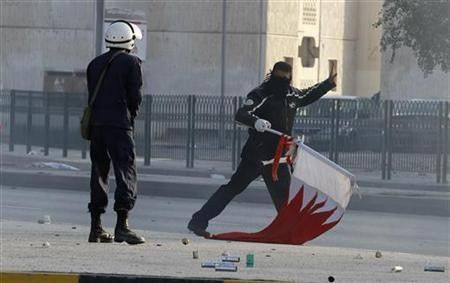Thousands of protesters march to Bahrain capitalThousands of protesters march to Bahrain capital

Thousands of Shi'ite protesters marched into the capital of Bahrain on Tuesday after a man was killed in clashes between police and mourners at a funeral for a demonstrator shot dead at an earlier anti-government rally.
The death, a day after a Day of Rage of protests on Monday, raised the prospect of further clashes between Bahrain's majority Shi'ite Muslims and the Sunni security forces backed by the ruling Al Khalifa dynasty.
Bahrain's main Shi'ite opposition bloc Wefaq, which accuses rulers of discriminating and neglecting Shi'ites, responded to the violence by boycotting parliament. Enraged mourners chanted anti-government slogans inspired by protests that toppled the rulers of Egypt and Tunisia.
The people demand the fall of the regime! they said, as thousands poured into Pearl Roundabout in Manama's city centre. They had marched from the funeral on the outskirts of Manama. Dozens of police cars were parked 500 metres away.
Protesters said their principal demand was the resignation of Prime Minister Sheikh Khalifa bin Salman al-Khalifa who has governed the country since its independence in 1971.
An uncle of King Hamad bin Isa al-Khalifa, he is thought to own a great deal of land and is seen as a symbol of the wealth of the ruling family.
Protesters don't want to topple the ruling family, but the end of this government and the prime minister, said Aly, a 49-year-old protester who declined to give his full name.
Protesters say they are also demanding the release of political prisoners, which the government earlier said it would do, and the creation of a new constitution.
We need a government from the people, not only the Khalifa family, another protester from the flashpoint Shi'ite village of Karzakan, where protests and clashes with police are common.
Poverty, high unemployment and attempts by the government to grant Sunnis from outside the country citizenship in order to change the demographic balance lie at the heart of deep-seated discontent among Bahrain's Shi'ites.
Around half of the country's 1.3 million people are Bahraini, with the rest being foreign workers. The majority of citizens are Shi'ite.
2,000 PEOPLE WERE ESCORTING BODY
Witnesses said the clashes broke out when around 2,000 people set out from hospital to escort the body of slain protester Ali Mushaima through the alleys of Shi'ite villages towards his home, where his body was to be washed before burial.
Diplomats say Bahrain's protests may gauge whether a larger Shi'ite base can be drawn in to raise pressure for reforms that would give them a greater voice and better economic prospects.
Analysts say large-scale unrest in Bahrain, also home to the U.S. Navy's Fifth Fleet and a regional offshore banking centre, could also embolden fellow marginalised Shi'ites in nearby Saudi Arabia, the world's biggest oil exporter.
King Hamad expressed his condolences for the death of two of our dear sons in a televised speech and said a committee would investigate the killings.
We will ask legislators to look into this issue and suggest needed laws to resolve it, he said, adding that peaceful protests were legal in Bahrain.
Stability concerns pushed up the cost of insuring Bahrain's debt to the highest level since August 2009, with 5-year credit default swaps rising 12 basis points, according to Markit.
Mushaima, the 22-year-old man being buried on Tuesday, was killed on Monday in clashes in Daih village as security forces clamped down on Shi'ite areas in the Gulf Arab kingdom.
Wefaq parliamentarian Ibrahim Mattar told Reuters police had tried to disperse the funeral procession using tear gas, but that mourners then regrouped and continued their procession. He said man who was killed at on Tuesday was shot.
Bahrain police said the mourners had clashed with four police patrol vehicles at the scene when one of them broke down and the other three were trying to remove it. One person, Fadhel Salman Matrook, was wounded and later died in hospital.
Bahrain, in a move appeared aimed at preventing Shi'ite discontent from boiling over, had offered cash payouts of around 1,000 dinars (£1,640) per family in the run-up to the February 14 protests, held mainly in Shi'ite villages outside of Manama.
But some protesters said that was not the solution: Don't feed me, give me my freedom and I can eat on my own, said the protester Ali, from a Shi'ite village.
Bahrain, which unlike Gulf Arab peers has little spare cash to use for social problems, has also said it would spend an extra $417 million (£258 million) on social items, including food subsidies, reversing attempts to prepare the public for cuts.
© Copyright Thomson Reuters 2024. All rights reserved.





















